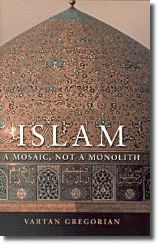Two of her picks:
Islam by Vartan GregorianClick here to see House's other recommendations.
Because the world is locked in a prolonged struggle with terrorists brandishing the banner of Islam, it behooves us all to know much more about the Islamic religion, with its 1.2 billion adherents, only 15% of whom are Arab. Vartan Gregorian, president of the Carnegie Foundation, has produced the perfect primer. At 135 pages, it is simple but not simplistic. Subtitled "A Mosaic, Not a Monolith," the book traces Islam's origins, when the Prophet Muhammad received the religion's tenets from Allah, the only God, and its long evolution since. As both spiritual leader and temporal warrior, Muhammad forced Arabia's polytheists to worship Allah instead. Over the next seven centuries, the religion spread rapidly, from the Middle East and North Africa to Spain and Russia. Islam's more recent history has been marked by deep divisions between modernists and traditionalists--rifts that are likely to remain, Mr. Gregorian argues, unless Muslims are prompted to unite by the West's misguided insistence on lumping them all together as "the enemy."
Wahhabi Islam by Natana J. Delong-Bas
Ibn Abd al-Wahhab, the l8th-century jurist, preached a back-to-basics form of Islam: Live daily according to the precepts of the Koran and hadith or be damned to hell. This book is an excellent introduction for the serious reader to Wahhabi fundamentalism, which is flourishing in Saudi Arabia today. Natana J. Delong-Bas explains the Wahhabi views of women, marriage and jihad. Regarding jihad, she argues that Osama bin Laden has radically distorted the founder's teachings. One is left wondering why Wahhabis don't speak out against bin Laden and his barbaric brand of Islam.
Previously on the blog: Professor Joseph Lowry of the University of Pennsylvania suggested two very interesting medieval philosophical novels from the Islamic tradition. Click here to read more about those books.
--Marshal Zeringue







